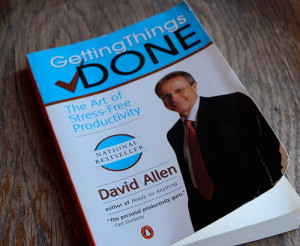 This article was originally published a few years ago at the RockStar Success Library.
This article was originally published a few years ago at the RockStar Success Library.
I had two opposing thoughts when I first came upon Getting Things Done.
Thought one: “Cool, another book on productivity.”
Thought two: “Oh great, another book on productivity.”
There are a lot of books on productivity and time management out there, enough to make you wonder about the value of each new one that comes out. Since I work with a lot of my coaching clients about work balance, and time management, I try to give most of them at the least a quick run through.
Getting Things Done lays out a pretty comprehensive system to increase your personal productivity. David’s main contention is that there are too many loose ends (what he calls open loops) in your mind and on the various information capturing devices in your life (e-mail/voice mail/notes on your desk/etc.). By having a system that captures all of this and then taking the time to process it, you’ll become more productive because you won’t lose ideas and because you won’t have clutter in your mind. The system itself makes sense, but it’s not much different than other systems out there. It’s a little on the complex side and requires you to be really disciplined, which really is the crux of all time management pieces.
Ideas, Implications and Questions:
- Even though his organizational system is pretty standard, there are a few observations that David makes that have a lot of power. The first is the idea of closing “open loops”. He makes the comparison between our ability to keep things in our mind and a computer’s RAM. By writing out everything you have on your mind into a place you’ll check, you can clear that “human RAM” which can make life a lot easier and allow you to think more clearly.
- That being said, I’ve taken his idea and incorporated a way for me to write down all the thoughts that I have that I want to remember, big and small. Whether it’s a new blog idea, a prospecting call, or the fact that I have to buy paper towels, it’s good to have one place where I can capture that info – one that I know I’ll refer to regularly.
- I’m reminded of the need in my weekly planning session with myself to look back over that list and any other projects I have open.
- I love David’s connection of the goals we have for our time with our personal integrity. He points out that when we plan to do something we are making an agreement with ourself, and when we don’t do an activity we are breaking our agreement. He feels that this can have a lot of subconscious negative effects – and I agree with him completely.
- He also points out the need to be action-step oriented. This brought up a great question for me. How can I be more action-step oriented and what projects are stalled because I haven’t figured out the next action step.
Should You Read This?
If you haven’t read a good productivity or time management book in a while, this wouldn’t be bad to pick up. As I said, the program is solid, even if it’s nothing really new. If you have 30 minutes and you’re hanging around in a book store, reading Part 3 would give you some good, quick insights.
